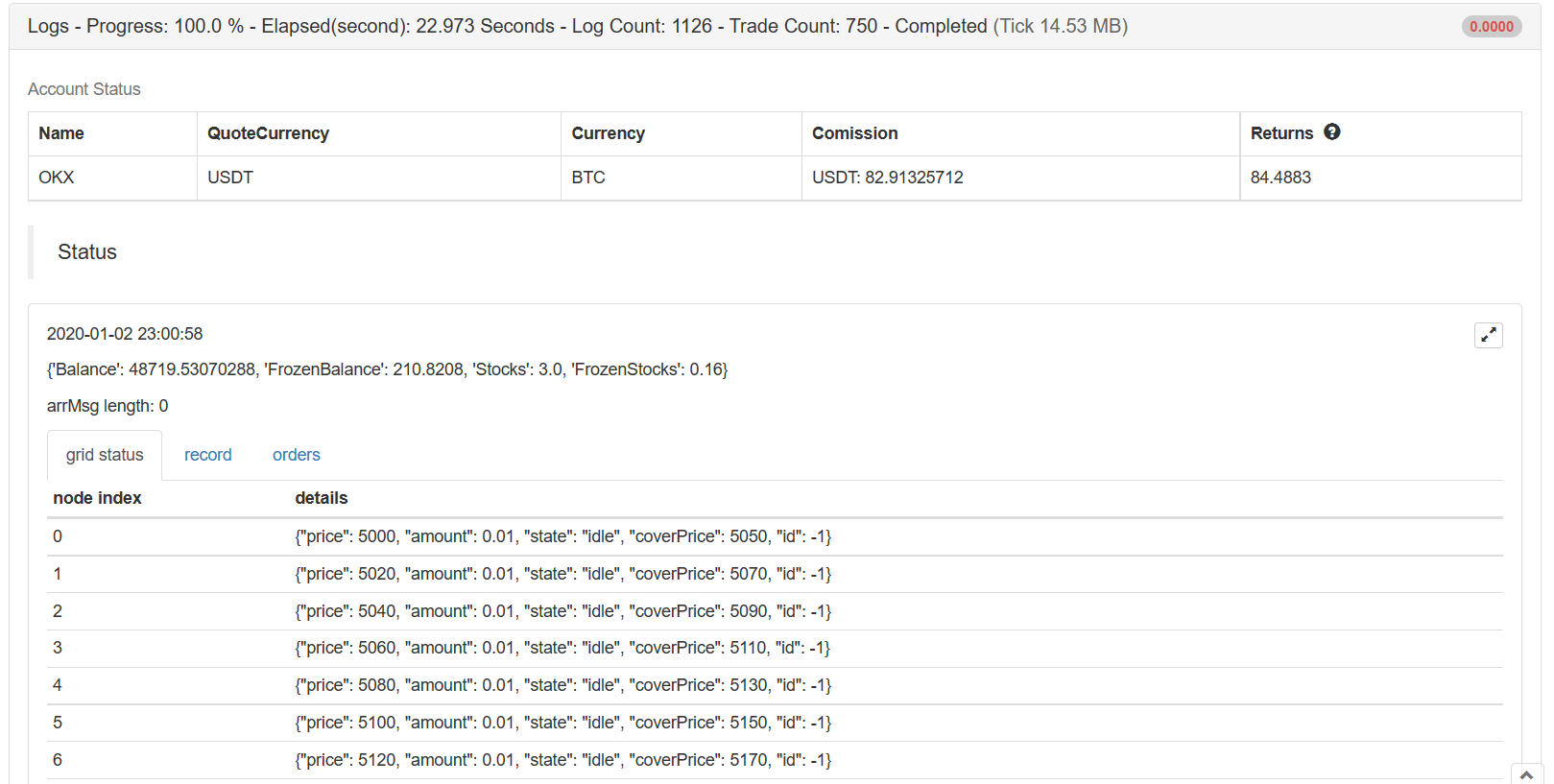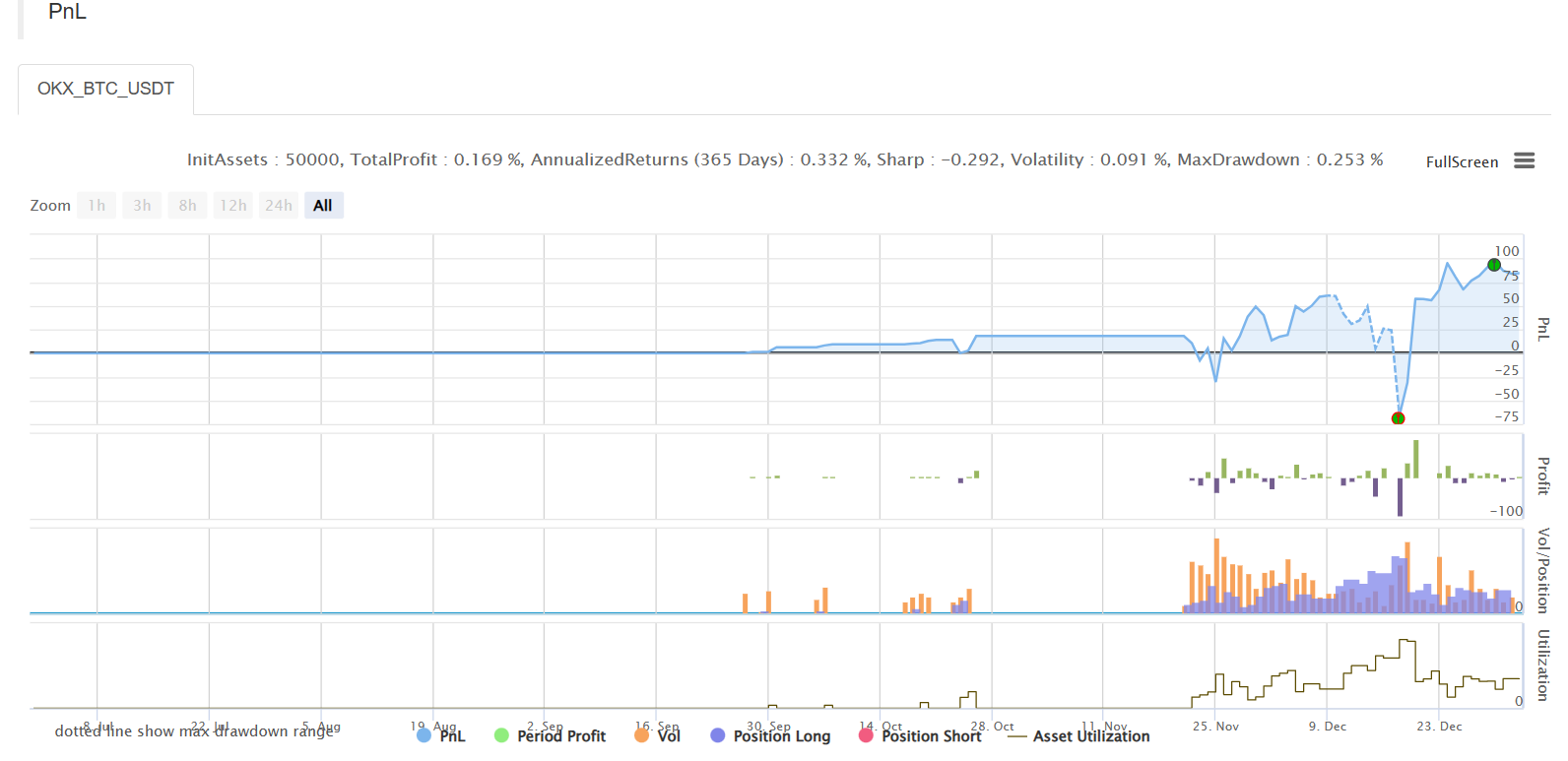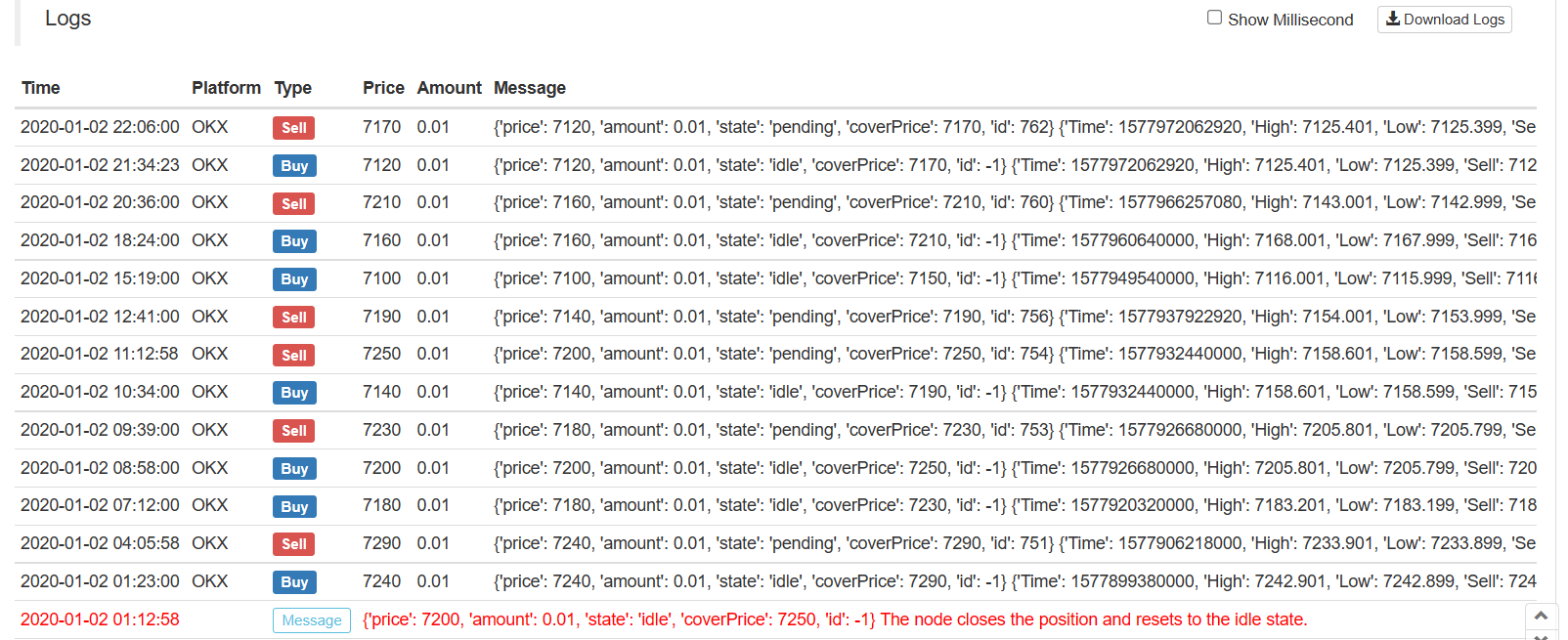Strategi grid sederhana dalam versi Python
Penulis:FMZ~Lydia, Dibuat: 2022-12-23 21:00:45, Diperbarui: 2023-09-20 11:17:48
Strategi grid sederhana dalam versi Python
Tidak ada banyak strategi Python di kuadrat strategi. Versi Python dari strategi grid ditulis di sini. Prinsip strategi sangat sederhana. Serangkaian node grid dihasilkan oleh jarak harga tetap dalam kisaran harga. Ketika pasar berubah dan harga mencapai posisi harga node grid, pesanan beli ditempatkan. Ketika pesanan ditutup, yaitu, sesuai dengan harga pesanan yang sedang menunggu ditambah spread keuntungan, tunggu pesanan jual untuk menutup posisi. Tangkap fluktuasi dalam kisaran harga yang ditetapkan.
Tidak perlu dikatakan bahwa risiko strategi grid adalah bahwa setiap strategi jenis grid adalah taruhan bahwa harga berfluktuasi dalam kisaran tertentu. Setelah harga keluar dari kisaran grid, itu dapat menyebabkan kerugian mengambang yang serius. Oleh karena itu, tujuan menulis strategi ini adalah untuk memberikan referensi untuk ide menulis strategi Python atau desain program. Strategi ini digunakan untuk belajar saja, dan mungkin berisiko dalam bot nyata.
Penjelasan ide strategi ditulis langsung dalam komentar kode strategi.
Kode Strategi
'''backtest
start: 2019-07-01 00:00:00
end: 2020-01-03 00:00:00
period: 1m
exchanges: [{"eid":"OKEX","currency":"BTC_USDT"}]
'''
import json
# Parameters
beginPrice = 5000 # Grid interval begin price
endPrice = 8000 # Grid interval end price
distance = 20 # Price distance of each grid node
pointProfit = 50 # Profit spread per grid node
amount = 0.01 # Number of pending orders per grid node
minBalance = 300 # Minimum fund balance of the account (at the time of purchase)
# Global variables
arrNet = []
arrMsg = []
acc = None
def findOrder (orderId, NumOfTimes, ordersList = []) :
for j in range(NumOfTimes) :
orders = None
if len(ordersList) == 0:
orders = _C(exchange.GetOrders)
else :
orders = ordersList
for i in range(len(orders)):
if orderId == orders[i]["Id"]:
return True
Sleep(1000)
return False
def cancelOrder (price, orderType) :
orders = _C(exchange.GetOrders)
for i in range(len(orders)) :
if price == orders[i]["Price"] and orderType == orders[i]["Type"]:
exchange.CancelOrder(orders[i]["Id"])
Sleep(500)
def checkOpenOrders (orders, ticker) :
global arrNet, arrMsg
for i in range(len(arrNet)) :
if not findOrder(arrNet[i]["id"], 1, orders) and arrNet[i]["state"] == "pending" :
orderId = exchange.Sell(arrNet[i]["coverPrice"], arrNet[i]["amount"], arrNet[i], ticker)
if orderId :
arrNet[i]["state"] = "cover"
arrNet[i]["id"] = orderId
else :
# Cancel
cancelOrder(arrNet[i]["coverPrice"], ORDER_TYPE_SELL)
arrMsg.append("Pending order failed!" + json.dumps(arrNet[i]) + ", time:" + _D())
def checkCoverOrders (orders, ticker) :
global arrNet, arrMsg
for i in range(len(arrNet)) :
if not findOrder(arrNet[i]["id"], 1, orders) and arrNet[i]["state"] == "cover" :
arrNet[i]["id"] = -1
arrNet[i]["state"] = "idle"
Log(arrNet[i], "The node closes the position and resets to the idle state.", "#FF0000")
def onTick () :
global arrNet, arrMsg, acc
ticker = _C(exchange.GetTicker) # Get the latest current ticker every time
for i in range(len(arrNet)): # Iterate through all grid nodes, find out the position where you need to pend a buy order according to the current market, and pend a buy order.
if i != len(arrNet) - 1 and arrNet[i]["state"] == "idle" and ticker.Sell > arrNet[i]["price"] and ticker.Sell < arrNet[i + 1]["price"]:
acc = _C(exchange.GetAccount)
if acc.Balance < minBalance : # If there is not enough money left, you can only jump out and do nothing.
arrMsg.append("Insufficient funds" + json.dumps(acc) + "!" + ", time:" + _D())
break
orderId = exchange.Buy(arrNet[i]["price"], arrNet[i]["amount"], arrNet[i], ticker) # Pending buy orders
if orderId :
arrNet[i]["state"] = "pending" # Update the grid node status and other information if the buy order is successfully pending
arrNet[i]["id"] = orderId
else :
# Cancel h/the order
cancelOrder(arrNet[i]["price"], ORDER_TYPE_BUY) # Cancel orders by using the cancel function
arrMsg.append("Pending order failed!" + json.dumps(arrNet[i]) + ", time:" + _D())
Sleep(1000)
orders = _C(exchange.GetOrders)
checkOpenOrders(orders, ticker) # Check the status of all buy orders and process them according to the changes.
Sleep(1000)
orders = _C(exchange.GetOrders)
checkCoverOrders(orders, ticker) # Check the status of all sell orders and process them according to the changes.
# The following information about the construction status bar can be found in the FMZ API documentation.
tbl = {
"type" : "table",
"title" : "grid status",
"cols" : ["node index", "details"],
"rows" : [],
}
for i in range(len(arrNet)) :
tbl["rows"].append([i, json.dumps(arrNet[i])])
errTbl = {
"type" : "table",
"title" : "record",
"cols" : ["node index", "details"],
"rows" : [],
}
orderTbl = {
"type" : "table",
"title" : "orders",
"cols" : ["node index", "details"],
"rows" : [],
}
while len(arrMsg) > 20 :
arrMsg.pop(0)
for i in range(len(arrMsg)) :
errTbl["rows"].append([i, json.dumps(arrMsg[i])])
for i in range(len(orders)) :
orderTbl["rows"].append([i, json.dumps(orders[i])])
LogStatus(_D(), "\n", acc, "\n", "arrMsg length:", len(arrMsg), "\n", "`" + json.dumps([tbl, errTbl, orderTbl]) + "`")
def main (): # Strategy execution starts here
global arrNet
for i in range(int((endPrice - beginPrice) / distance)): # The for loop constructs a data structure for the grid based on the parameters, a list that stores each grid node, with the following information for each grid node:
arrNet.append({
"price" : beginPrice + i * distance, # Price of the node
"amount" : amount, # Number of orders
"state" : "idle", # pending / cover / idle # Node Status
"coverPrice" : beginPrice + i * distance + pointProfit, # Node closing price
"id" : -1, # ID of the current order related to the node
})
while True: # After the grid data structure is constructed, enter the main strategy loop
onTick() # Processing functions on the main loop, the main processing logic
Sleep(500) # Control polling frequency
Ide desain utama dari strategi ini adalah untuk membandingkan daftar saat ini dari pesanan menunggu dikembalikan olehGetOrdersmenginterface sesuai dengan struktur data grid yang dikelola oleh Anda sendiri. Menganalisis perubahan pesanan tertunda (apakah mereka ditutup atau tidak), memperbarui struktur data grid, dan melakukan operasi berikutnya. Selain itu, pesanan tertunda tidak akan dibatalkan sampai transaksi selesai, bahkan jika harga menyimpang, karena pasar mata uang digital sering memiliki situasi pin, pesanan tertunda ini juga dapat menerima pesanan pin (jika jumlah pesanan tertunda terbatas di bursa, itu akan disesuaikan).
Visualisasi data strategi menggunakanLogStatusfungsi untuk menampilkan data pada bilah status secara real time.
tbl = {
"type" : "table",
"title" : "grid status",
"cols" : ["node index", "details"],
"rows" : [],
}
for i in range(len(arrNet)) :
tbl["rows"].append([i, json.dumps(arrNet[i])])
errTbl = {
"type" : "table",
"title" : "record",
"cols" : ["node index", "details"],
"rows" : [],
}
orderTbl = {
"type" : "table",
"title" : "orders",
"cols" : ["node index", "details"],
"rows" : [],
}
Tiga tabel dibangun. Tabel pertama menampilkan informasi dari setiap node dalam struktur data grid saat ini, tabel kedua menampilkan informasi abnormal, dan tabel ketiga menampilkan informasi daftar yang sebenarnya dari pertukaran.
Backtest



Alamat Strategi
Strategi ini hanya untuk tujuan belajar dan backtesting, dan dapat dioptimalkan dan ditingkatkan jika Anda tertarik.
- Penjelasan tentang suite Lead-Lag dalam mata uang digital (3)
- Pengantar ke Lead-Lag Arbitrage dalam Cryptocurrency (2)
- Penjelasan tentang suite Lead-Lag dalam mata uang digital (2)
- Pembahasan Penerimaan Sinyal Eksternal Platform FMZ: Solusi Lengkap untuk Penerimaan Sinyal dengan Layanan Http Terbina dalam Strategi
- FMZ platform eksplorasi penerimaan sinyal eksternal: strategi built-in https layanan solusi lengkap untuk penerimaan sinyal
- Pengantar ke Lead-Lag Arbitrage dalam Cryptocurrency (1)
- Penjelasan tentang suite Lead-Lag dalam mata uang digital (1)
- Diskusi tentang Penerimaan Sinyal Eksternal dari Platform FMZ: API Terluas VS Strategi Layanan HTTP Terintegrasi
- FMZ Platform Eksternal Signal Reception: Extension API vs Strategi Layanan HTTP Terbentuk
- Diskusi tentang Metode Pengujian Strategi Berdasarkan Generator Random Ticker
- Metode pengujian strategi berdasarkan generator pasar acak
- Alat yang lebih baik membuat pekerjaan yang baik - belajar menggunakan lingkungan penelitian untuk menganalisis prinsip perdagangan
- Strategi lindung nilai lintas mata uang dalam perdagangan kuantitatif aset blockchain
- Dapatkan panduan strategi mata uang digital FMex di FMZ Quant
- Mengajarkan Anda untuk menulis strategi -- transplantasi strategi MyLanguage (Advanced)
- Mengajarkan Anda untuk menulis strategi -- menanam strategi MyLanguage
- Mengajarkan Anda untuk menambahkan dukungan multi-chart untuk strategi
- Mengajarkan Anda untuk menulis fungsi sintesis K-line dalam versi Python
- Analisis Strategi Saluran Donchian dalam Lingkungan Penelitian
- Ketika FMZ menemukan ChatGPT, ingatlah percobaan menggunakan AI untuk membantu belajar transaksi kuantitatif
- Alat perdagangan kuantitatif untuk opsi mata uang digital
- Strategi aliran pesanan yang menunggu linier yang dikembangkan berdasarkan fungsi pemutaran data
- Strategi untuk membeli pemenang versi Python
- Perjalanan FMZ -- dengan Strategi Transisi
- Mengajarkan Anda untuk mengubah strategi Python satu spesies menjadi strategi multi spesies
- Mengimplementasikan robot perdagangan kuantitatif dimulai atau berhenti waktu gadget dengan menggunakan Python
- Oak mengajarkan Anda untuk menggunakan JS untuk antarmuka dengan FMZ diperluas API
- Panggilan Dingding antarmuka untuk menyadari robot push pesan
- Strategi Pending Order yang Seimbang (Strategi Pengajaran)
- Pikiran tentang pergerakan aset melalui strategi lindung nilai kontrak
- Bertahun-tahun kemudian, Anda akan menemukan artikel ini adalah yang paling berharga dalam karir investasi Anda - mencari tahu di mana pengembalian dan risiko berasal dari